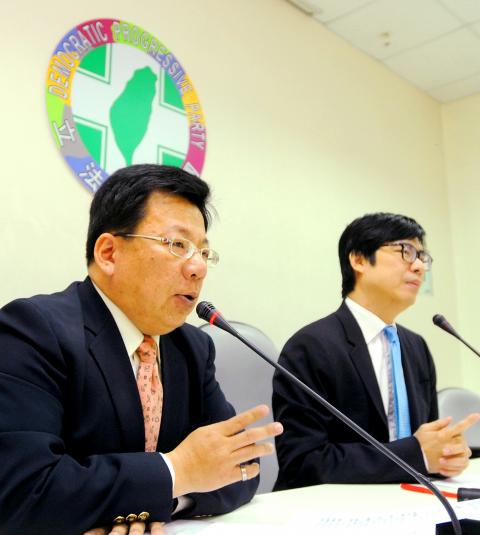|
PENSION REFORM:
Pan-green camp slams pension reform
DANCING ELEPHANT? The DPP said that Ma’s plan
did not address core issues of fairness and said that private-sector workers
might ‘storm the legislature’ in response
By Chris Wang / Staff reporter

Democratic Progressive Party
legislators Lee Chun-yi, left, and Chen Chi-mai, right, accuse President Ma
Ying-jeou at a press conference yesterday of missing the point after Ma
announced that he would give up his right to the preferential 18 percent
interest rate on state employee pensions.
Photo: Wang Yi-sung, Taipei Times
The pan-green camp yesterday called
President Ma Ying-jeou’s (馬英九) pension reform plan a “pseudo” reform, adding
that his announcement that he would give up his right to the 18 percent
preferential interest rate given to state employee pensions as “a selfish act to
try and fix his reputation.”
Ma has flip-flopped and failed in all his reform plans during his time in
office, Democratic Progressive Party (DPP) caucus convener Ker Chien-ming (柯建銘)
said, citing as examples the capital gains tax on securities transactions, the
year-end bonuses for retired civil servants and the amendment of media
regulation laws.
“It is difficult to teach an elephant how to dance, but it’s even more difficult
to expect Ma to implement true reform,” Ker said.
The government’s pension reform proposal has failed to address the core issue of
pension system reform — the income replacement rate, in particular that of
civil, education and military workers, Ker said.
Ma’s pledge in April last year to send amendment proposals to the Legislative
Yuan was a strategy to tame a potential recall that had been tentatively planned
for around May 20, the anniversary of his second inauguration, Ker said.
DPP Legislator Lee Chun-yi (李俊俋) said Ma’s proposed pension reform would likely
increase the payment gap between retired private-sector workers and civil
servants, public school teachers and military personnel.
The government’s plan has sacrificed the interests of private-sector employees
and low-level civil servants, DPP Legislator Chen Chi-mai (陳其邁) said, adding
that civil, education and military state employees’ pensions should be the focus
of any reform.
Lin Wan-i (林萬億), the executive director of the DPP’s think tank, said Ma’s plan
would likely infuriate non-state workers and incite a fresh wave of public
discontent.
“I would not be surprised to see private-sector workers storm the legislature to
ask for changes,” Lin said.
The proposal did not say how it would resolve the potential bankruptcy of the
Labor Insurance Fund, the difference in pensions between various occupations and
the financial vulnerability of future generations, Taiwan Solidarity Union (TSU)
legislative caucus whip Huang Wen-ling (黃文玲) said.
The “chaotic” plan was hastily prepared to assuage the public’s anger and would
be unable to solve the pension system’s issues, she added.
Ma sacrificing the 18 percent preferential interest rate on his pension has
nothing to do with reforming the national pension system that people from all
occupations care about and are affected by, DPP Chairman Su Tseng-chang (蘇貞昌)
said.
By saying that he would give up the special rate on his pension, Ma appeared to
be hinting that the preferential rate would not be scrapped in its entirety, Su
said.
“Giving up this preferential treatment is not something to brag about,
especially since many DPP officials gave theirs up years ago,” former premier
Frank Hsieh (謝長廷) said.
Separately, Taiwan Labor Front secretary-general Son Yu-lian (孫友聯) called the
reform a “nuclear disaster.”
Several labor groups are working to stage a large-scale demonstration against
it, he added.
“[The reform plan] is like a nuclear disaster, because it’s something that
happens because a few people make a mistake, but affects everyone — we would all
be made victims,” Son said.
He said taking a large percentage of a worker’s income to put into their
retirement pension fund deprives the worker of quality of life.
“If the government does not reconsider and revise its plan, labor groups are
prepared to stage a large-scale demonstration in May,” he said.
Additional reporting by Loa Iok-sin
|
![]()
![]()
![]()